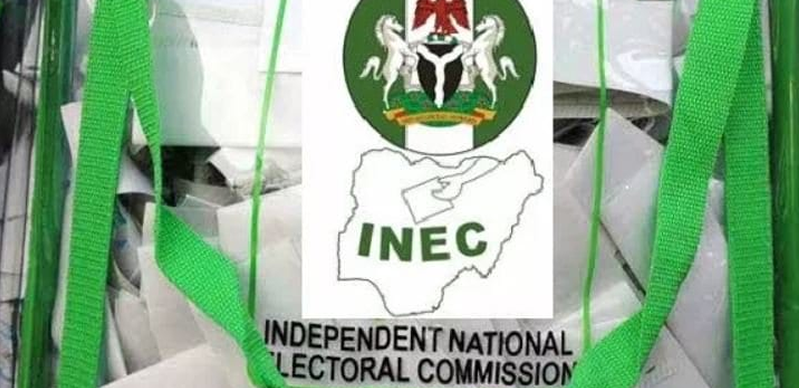Politics
Elections 2023: INEC Releases Final List Of Presidential, National Assembly Candidates

The Independent National Electoral Commission (INEC), yesterday, released the final list of presidential and National Assembly candidates of all the political parties contesting the February 25 elections.
The publication of the final list of candidates for national elections (presidential, senatorial and federal constituencies) was pursuant to section 32(1) of the Electoral Act 2022 and item 8 of the Timetable and Schedule of Activities for the 2023 General Election.The publication of the full names and addresses of all nominated candidates followed the conduct of primaries and completion of the nomination exercise by political parties’.
It was also sequel to the display of the personal particulars of all nominated candidates in their constituencies nationwide as provided by section 29(3) of the Electoral Act.INEC National Commissioner in charge of Information and Chairman, Voter Education, Festus Okoye, had earlier said validly nominated candidates had the opportunity to voluntarily withdraw their candidature by notice in writing and personally deliver such notices to the political parties that nominated them for the election.
Okoye said, “Thereafter, political parties substituted such candidates under section 31 of the Electoral Act for which the last day was 15th July 2022 for national elections and 12th August, 2022, for state elections as clearly provided in item 6 of the Commission’s Timetable and Schedule of Activities.“Thereafter, no withdrawal or substitution of candidates is allowed except in the event of death as provided in section 34(1) of the Electoral Act or pursuant to an order of a Court of competent jurisdiction.”
The list published contains the names of candidates validly nominated for national elections at the close of the parties’ primaries and the period earmarked for withdrawal and substitution of candidates.The presidential candidates of PDP, Atiku Abubakar; APC, Bola Tinubu; Labour Party, Peter Obi; and New Nigeria Peoples Party, Rabiu Kwankwaso, were on the final list.
Similarly on the presidential list were Oluwafemi Adenuga, presidential candidate of Boot Party (BP) and the running mate Turaku Mustapha; Daberechukwu Nwanyanwu, presidential candidate of Zenith Labour Party (ZLP) and the running mate, Ramalan Abubakar; Dumebi Kachikwu presidential candidate, African Democratic Congress (ADC) and his running mate, Ahmed Mani; Hamsa Almustafa, presidential candidate, Action Aliance (AA) and his running mate, Chukwuka Johnson, among others.
The list published contained the names of Senator Goodwill Akoabio from Akwa Ibom state and Senator Peter Nwaobishi of Delta State as well as Bashir Machina, who replaced the senate president, Ahmed Lawam.Akpabio replaced former retired Deputy Inspector General of Police, Ekpuudom, while Nwaoboshi, who was convicted for seven years by the Court of appeal in Lagos, is also on the list.
Read Also: OPC and Yoruba Nation Agitators fight in Ojota, One Dead (VIDEO)
48 Million Out of 93.5 Million Eligible Voters are Youths, INEC Reveals
INEC disclosed that youths formed the highest number of registered voters who would vote in the February and March elections. National Commissioner at INEC in charge of Information and Voter Education Committee, Mr. Festus Okoye, stated this during the commission’s engagement with identified groups on the role of the youth ahead of the 2023 general election.
Okoye said from INEC’s records, the youth held all the aces to determine the outcome of the 2023 elections.He said out of a total of 9,518,756 valid newly registered voters between June 28, 2021 and July 31, 2022, those aged between 18 and 34 years of age were 7,286,871, representing 76.56 per cent.
Disclosing further that the total of registered voters for the general election was 93.5 million, Okoye said of the 84 million registered voters recorded for the 2019 general election, the youth population, which included males and females, was 51 per cent.He urged the youths to ensure that they cast their votes on election day, emphasising that it is only when they do so that they would determine who would lead them.
Okoye explained that the electoral process would be strictly technology-driven, adding that the commission has already deployed technology in all its processes.He said, “The commission had already taken delivery of the full number of the Bimodal Voter’s Accreditation System, for the conduct of the election in the 176,846 polling units across the federation. Additional BVAS for contingencies would be deployed to the 8,809 registration areas across the country.“The BVAS were designed to function offline, and, that only accredited voters would be allowed to cast votes on the day of the polls.“Only registered voters, who present their Permanent Voters Cards at the polling unit, would be accredited to vote.
“Over 1.4 million ad-hoc election staff had been engaged by the commission for the conduct of the 2023 general election, and insurance policy had been secured for them against hazards of the election, especially possible attack.“Punishment for any act of electoral offence against electoral officers has been made stiffer in the current 2022 Electoral Act (as amended) than the provisions in the previous 2010 Electoral Act (as amended).”
Okoye advised any ad-hoc staff who might not be ready to resist the temptations of election rigging antics to withdraw from conducting the exercise.Earlier, Resident Electoral Commissioner (REC) in charge of Anambra State, Mrs. Queen Elizabeth Agwu, urged the youth to brace up for the challenges of ensuring that the election was conducted free of thuggery and any other electoral malpractices.